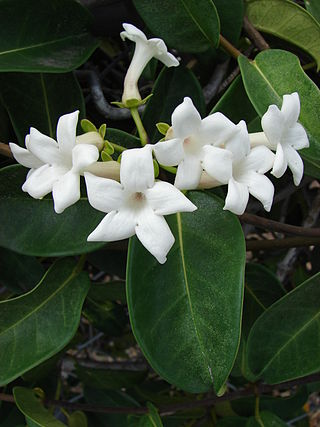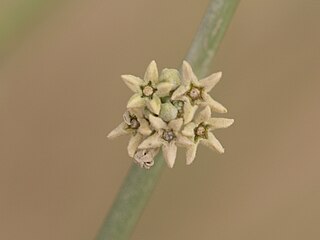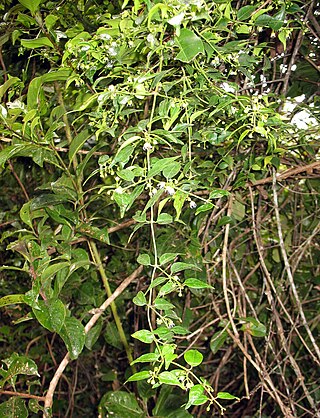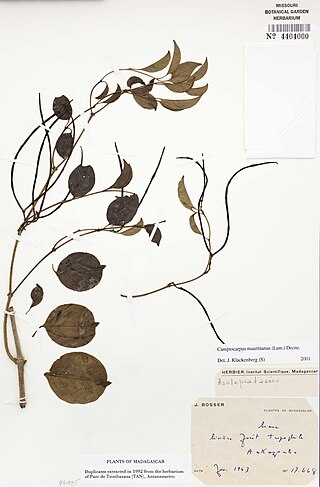
The Asclepiadoideae are a subfamily of plants in the family Apocynaceae. Formerly, they were treated as a separate family under the name Asclepiadaceae, e.g. by APG II, and known as the milkweed family.

Cynanchum is a genus of about 300 species including some swallowworts, belonging to the family Apocynaceae. The taxon name comes from Greek kynos and anchein, hence the common name for several species is dog-strangling vine. Most species are non-succulent climbers or twiners. There is some evidence of toxicity.

Joseph Decaisne was a French botanist and agronomist. He became an aide-naturaliste to Adrien-Henri de Jussieu (1797-1853), who served as the chair of rural botany. It was during this time that he began to study plants brought back by various travelers like those of Victor Jacquemont (1801-1832) from Asia. Decaisne used applied research, most notably on the agronomy of the madder, the yam and the ramie. He was also interested in algae.

Oxypetalum is a genus of flowering plants in the family Apocynaceae, first described with this name in 1810. The genus is native to South America.

Marsdenia is a genus of plants in the family Apocynaceae first described as a genus in 1810. It is named in honor of the plant collector and Secretary of the Admiralty, William Marsden. The plants are native to tropical regions in Asia, Africa, Australia, and the Americas.

Elaeodendron is a genus of flowering plants in the staff vine family, Celastraceae. It includes 39 species native to the tropics of the Americas, sub-Saharan Africa, Asia, Australia, and the South Pacific.

Periplocoideae is a subfamily of the dogbane plant family, Apocynaceae. It was not divided into tribes as of 2014.

Secamonoideae is a subfamily of the dogbane family, Apocynaceae.

Genianthus is a genus of plants in the family Apocynaceae, first described as a genus in 1883. It is native to southern China, the Indian Subcontinent, and Southeast Asia.

Leptadenia is a genus of plants in the family Apocynaceae, first described as a genus in 1810. It is native to Africa, including Madagascar, as well as southwest Asia and the Indian Subcontinent.
- Leptadenia arborea(Forssk.) Schweinf. - Sudan, Ethiopia
- Leptadenia lancifolia(Schumach. & Thonn.) Decne. - tropical Africa
- Leptadenia madagascariensisDecne. - Madagascar
- Leptadenia pyrotechnica(Forssk.) Decne. - widespread from Algeria to India
- Leptadenia reticulata(Retz.) Wight & Arn. - Madagascar
Pentopetia is a plant genus in the family Apocynaceae, first described as a genus in 1844.
Ischnolepis is a species of plants in the family Apocynaceae first described as a genus in 1909.
Pervillaea is a genus of plants in the family Apocynaceae, first described as a genus in 1844. It is native to Mauritius and Madagascar in the Indian Ocean.
- Pervillaea brevirostrisKlack. - Mauritius
- Pervillaea decaryi(Choux) Klack. - Madagascar
- Pervillaea phillipsoniiKlack. - Madagascar
- Pervillaea tomentosaDecne. - Madagascar
- Pervillaea venenata(Baill.) Klack. - Madagascar
Calyptranthera is a genus of plants in the family Apocynaceae, first described as a genus in 1996. The entire genus is endemic to Madagascar in the Indian Ocean.
Baroniella is a genus of flowering plants belonging to the family Apocynaceae.

Camptocarpus acuminatus is a species of plant in the Apocynaceae family. It is endemic to the Madagascar. Pierre Choux, the botanist who first formally described the species, named it after the tapering tips of its leaves, using the synonymous name Tanulepis acuminata.

Camptocarpus crassifolius is a species of plant in the Apocynaceae family. It is endemic to Madagascar. Joseph Decaisne, the botanist who first formally described the species, named it after its thick leaves.

Camptocarpus mauritianus is a species of plant in the Apocynaceae family. It is native to Comoros, Madagascar and Réunion. Jean-Baptiste Lamarck, the naturalist who first formally described the species named it, using the synonym Cynanchum mauritianum, after the region of the Indian Ocean that includes the island of Mauritius, although the type specimen he examined did not list a specific location.

Camptocarpus semihastatus is a species of plant in the Apocynaceae family. It is native to Madagascar. Jens Klackenberg, the botanist who formally described the species named it after the distinct coronal lobes of its flowers that resemble half the head of a spear.













